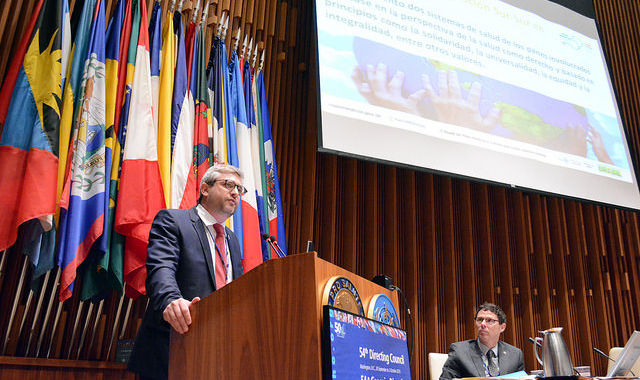Body
The program Mais Medicos (More doctors) in which collaborate Brazil, Cuba and the Pan American Health Organization (PAHO) is a good example of South-South cooperation, which could be applied to other member states have challenges to meet their needs health due to lack of doctors.

This was the consensus of a panel of health experts today discussed the Mais Medical Program during a side event under the 54th PAHO Directing Council.
The program, known as "Doctors Mais" ("More doctors"), has deployed more than 18,000 health professionals from Brazil and abroad, in more than 4,000 municipalities, mostly in remote areas socioeconomically vulnerable areas, outside of cities, or in the 34 special indigenous health districts. Nearly two thirds of health professionals involved are Cuban nationals, who joined the program through a technical cooperation project between PAHO / WHO and Ministries of Health of Brazil and Cuba.
"Brazil offers the countries of the region and others who may be interested in developing partnerships with the aim of strengthening health systems of the countries involved, with the experience and progress made by the program Mais Doctors "said Adriano Massuda, Deputy Minister of the Ministry of Science, Technology and Strategic Products from the Ministry of Health.
Massuda said the program was necessary because of the shortage of doctors in Brazil (1.8 doctors per 1,000 inhabitants), with more lack of these professionals in the poorest parts of the country. With Mais Doctors, the gap has narrowed and the country is on track to fully overcome with Brazilian doctors for 2026. In addition, the program's emphasis on primary care has led to a reduction in the number of hospitalizations.
PAHO has it facilitated the Brazilian Cuban collaboration as part of its global commitment to universal health coverage and universal access to health, as well as "to ensure that Brazilians in remote areas have access to health," he said PAHO Director, Carissa F. Etienne.
"This is one of the stronger South-South programs and their success would not have been possible without the collaboration of the Pan American Health Organization," said Massuda, who acknowledged the work of supervision, technical and administrative cooperation and monitoring and evaluation being conducted by PAHO.
Marcia Cobas Ruiz, vice minister of health of Cuba, thanked PAHO for the confidence they showed in the health care program outside of Cuba, and to facilitate and promote the program Mais Medical.
PAHO has noted "very positive results," Etienne said, adding that other assessments could be "very important to provide different lessons learned and share them with other Member States".

